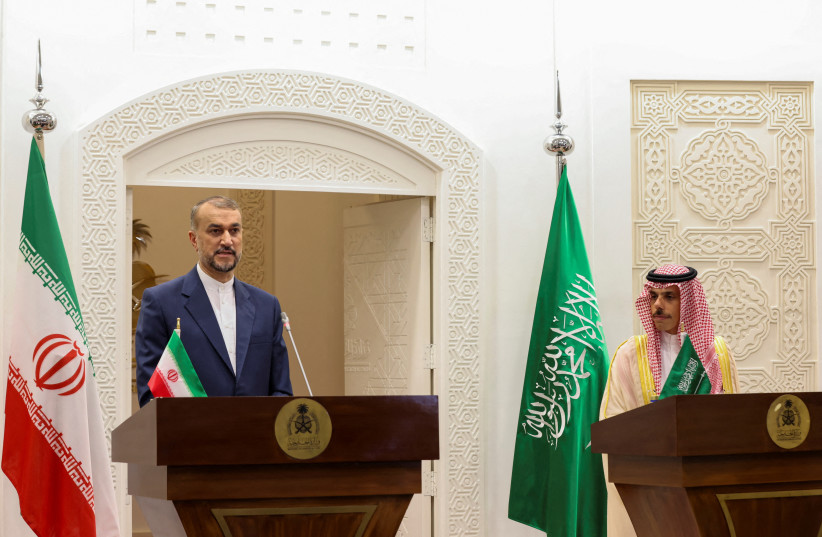There has been a flurry of top-level meetings this past week between Iran and Saudi Arabia, as the two rivals have been reconciling this year.
However, both Riyadh and Tehran appear to have downplayed some expectations.
There are many positive signs in terms of the reconciliation, such as the exchange of diplomats and re-opening of embassies. This is a win for Iran because it also has other agendas.
It wants to get around US sanctions and also show that it is a regional power. It has hopes that the Houthis in Yemen will also be legitimized and that Iran’s role in Iraq, Syria, and Lebanon will grow. Iran also hopes to undermine the US and Israel. These strategies are stated openly in Iran, where officials boast about the decline of US influence in the region.
Saudi Arabia's agenda behind Iran ties
However, Iran may not be the only one getting what it wants. Saudi Arabia also has an agenda and it has sought to shift its policies in the region. Riyadh and the UAE have both sought better ties with Damascus.

In addition, Riyadh’s independent policy now includes outreach to China and also the attempt to broker more deals in the region and abroad. This comes with increasing reports about positive development in potential Israel-Saudi ties.
Clearly, Iran’s attempts at inroads in Riyadh are not only for Tehran’s benefit. Saudi Arabia has seen how balancing ties with Iran and other countries can increase its clout in the West. This was the method Qatar used and also Turkey. Therefore managing expectations is important for Iran and Saudi Arabia.
Modest and moderated expectations
The modest expectations can be seen in reports from both countries, which have media that are linked to the state and as such the readouts from the reports shed light on the way both countries see the visit.
The readouts are not very long and keep to general themes such as “bilateral ties and explored future opportunities for cooperation.”
Stable relations are what the countries want now. The meeting between Mohammed bin Salman and the Iranian foreign minister lasted 90 minutes, reports say. Kuwait’s Foreign Minister Sheikh Salem Abdullah Al-Jaber Al-Sabah praised the Iranian visit, according to Arab News.
Kuwait has taken a very circumspect view of things in the region over the last decades, remaining outside the tensions between Riyadh and Tehran. Kuwait does not want a replay of what occurred in the 1980s. Kuwait also is more hostile to Israel than the UAE and Bahrain.
Therefore Kuwait views the reconciliation as a huge potential benefit for the Gulf.
The results from the meeting will be modest and it is likely that continued developments in Iraq, Yemen, Syria, and Lebanon will be watched closely.
Lebanon continues to lurch from one chaotic event to another, problems that have their roots in Iran’s backing of Hezbollah. In Syria, reports at Al-Monitor indicate the US will not act to interdict an Iranian corridor that goes through Iraq’s Al-Qaim to Albukamal on the Euphrates, and enables Iran to move weapons to Lebanon and Syria.
In Iraq, Iran’s backing of militias continues to threaten the US and also undermine the Kurdistan autonomous region. In Yemen, while some issues have been solved, the overall problem of the divisions in the country remains.
Therefore Iran-Saudi reconciliation can only go so far. There are many different issues in the region, and Iran’s role in numerous countries continues to destabilize those countries. Iran also seeks to incite against Israel and create tensions in the West Bank by using groups like Palestinian Islamic Jihad.
Iran’s hope is to use this to erode Saudi Arabia’s room for maneuvering relating to a potential deal with Israel. Riyadh is aware of all these machinations and therefore it is keeping expectations modest in terms of the incremental reconciliation with Tehran.
